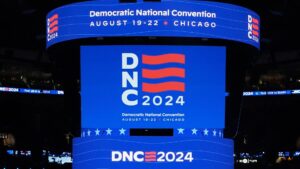
The National Interest Foundation Newsletter
Issue 249, August 23, 2024
Welcome to our NIF Newsletter. In this week’s edition, we delve into the major takeaways from the 2024 Democratic National Convention (DNC) in Chicago, provide analysis regarding the anti-war movement and coalition calling for a Gaza ceasefire’s potential influence on Vice President Harris’s policy stances towards Israel, and examine how leaked Israeli documents unveil an effort to evade a foreign agent lobbying law.
Editor: Bassam Tarbush
Major Takeaways from the 2024 Democratic National Convention in Chicago

The 4-day convention was held at Chicago’s United Center. (Photo from AP)
Major Takeaways from the 2024 Democratic National Convention in Chicago
Between Monday and Thursday of this week, the 2024 Democratic National Convention (DNC) was held in Chicago, as current U.S. Vice President Kamala Harris and Minnesota Governor Tim Walz officially accepted the Democratic Party’s nominations for presidential candidate and vice-presidential candidate, respectively. Delegates to the DNC cast votes to cement the Harris-Walz ticket in a ceremonial roll call to mark the virtual one that had been conducted earlier this month. The convention featured an array of speeches from high-profile figures including Former Presidents Barack Obama and Bill Clinton, incumbent President Joe Biden, Former U.S. Secretary of State Hillary Clinton, Former First Lady Michelle Obama, and U.S. Senator Bernie Sanders (I-VT), among others. Some of the main subjects addressed included a highlighting of accomplishments under President Biden, Democrats’ platform for pushing the U.S. forward, and the areas of focus of a potential Harris administration and how it contrasts with a possible second Trump term.
A theme that was evident at the DNC, particularly during the opening night on Monday, was what several observers deemed a sentiment of “passing the torch” from the “old guard” of the Democratic Party. This was discernable with President Biden’s appearance on the first evening of the convention, which came across as a celebration of his political legacy and a shift to embrace a new generation of political party leaders. Many of the speakers paid tribute to Biden, thanking him for his career in public service and accomplishments, while at the same time striving to build excitement for what is to come. Others referenced what they perceived as a yearning from much of the American population for a new generation of political leadership. They also stressed the need to look towards shaping the future of the country, including the importance of safeguarding freedoms and implementing forward-looking policies, and their belief that Vice President Harris was the right candidate to carry on that task.
Another point of emphasis throughout the course of the convention was a desire to offer up an optimistic outlook on the shared values and principles that bind Americans together, and a clear effort to try to distinguish that from what was viewed as the Trump campaign’s negative and divisive rhetoric. During Former President Obama’s remarks on Tuesday evening, for example, he criticized Trump for seeking to turn Americans against one another and commented that “Most of all, Donald Trump wants us to think that this country is hopelessly divided between us and them.” Obama also implored Democrats to show empathy to those with differing points of view, adding that “We need to remember that we’ve all got our blind spots and contradictions and prejudices; and that if we want to win over those who aren’t yet ready to support our candidate, we need to listen to their concerns – and maybe learn something in the process.” Former President Clinton struck a similar tone when he called on citizens not to demean or disrespect those that they disagree with. On the theme of drawing distinctions with Trump, in her nomination acceptance speech to close out the convention on Thursday evening, Vice President Harris aimed to contrast the two candidates’ visions for the future by pitching what was labeled as a “New Way Forward” agenda. With it and the upcoming election, she expressed that the nation has a “precious, fleeting opportunity to move past the bitterness, cynicism, and divisive battles of the past.”
The DNC also took place amid the presence of the ‘uncommitted’ movement, an initiative which won 30 delegates to the convention and has tried to use the electoral process to advocate for an end to the destructive Gaza war. The delegation and its supporters held a sit-in outside of the DNC after their request for a Palestinian-American to speak on the main stage was denied. Some elected officials had spoken in support of the group’s request, expressing that after the family of an Israeli-American hostage was given time to share their story, it would have been only right for a Palestinian-American speaker to also convey their anguish at the pain and devastation caused by the widely and increasingly criticized conflict. The delegates representing the ‘uncommitted’ movement had supported the idea of having the hostage’s family speak, and had merely sought the same platform for sharing their hurt regarding the abhorrent civilian death toll and distressing humanitarian crisis in Gaza as a result of the war.
Anti-War Movement and Coalition Calling for a Gaza Ceasefire’s Potential Influence on Harris’s Policy Stances Towards Israel

Demonstrators gathered in Chicago this week amid the city’s hosting of the Democratic National Convention. (Photo from The Chicago Tribune)
Anti-War Movement and Coalition Calling for a Gaza Ceasefire’s Potential Influence on Harris’s Policy Stances Towards Israel
With incumbent U.S. Vice President Kamala Harris being formally confirmed as her party’s 2024 presidential nominee at this week’s Democratic National Convention (DNC) in Chicago, a fair amount of attention has been paid to the potential influence that the ongoing anti-war movement and coalition calling for a Gaza ceasefire in the U.S. could have on Harris’s policy stances towards Israel. The destructive Gaza War has become a significant issue of concern, particularly within the Democratic Party. Critics of the Biden administration’s handling of it expressed their disapproval through large-scale demonstrations in Chicago amid the DNC, with anti-war activists seeing the convention as an opportune time to pressure Harris and the possible new administration regarding their policy positions. Support of Israel’s devastating military operations despite overwhelming evidence of war crimes and human rights violations has justifiably fueled months of anti-war sentiment, and prompted many to advocate for changes in U.S. policy on moral, legal, and strategic grounds. In these three aforementioned areas, Israel’s actions in Gaza have heinously killed tens of thousands of civilians and created a dire humanitarian crisis (moral), spurred cases over their illegality at both the International Court of Justice and the International Criminal Court (legal), and stoked an escalation in hostilities that have been detrimental to the prospects of maintaining regional peace and security (strategic). Thus, support of Israel’s war efforts does not serve in the best national interest of the United States from several perspectives.
Due to all of this, it has been argued that there is a need for top political figures like Vice President Harris to not only acknowledge the legitimate discontent with U.S. policy towards Israel, but also implement concrete changes to it. Specifically, anti-war activists have taken issue with the United States’ massive military and financial support of Israel’s operations through the approval of billions of dollars’ worth of U.S. weaponry – something that has persisted in spite of Israel’s use of American munitions to commit human rights abuses and war crimes in Gaza. Critics of the weapons sales have outlined how a cessation in the flow of arms would prevent the mass killing of more innocent civilians and allow for the much-needed delivery of humanitarian aid. It could also be used as a point of leverage to force Israel to put an end to the war.
In order to lend credence to the valid reasoning behind growing objection to U.S. weapons sales to Israel, during the preceding months since the onset of the conflict in Gaza, anti-war and human rights advocates have been trying to underscore how aid to Israel violates the Leahy Law – which was designed to prohibit the United States from assisting any foreign entity that commits gross human rights abuses. The law was passed by U.S. Congress back in 1997, and observers have highlighted that it has been applied hundreds of times – including against U.S. allies – but seemingly with the biased exception of Israel even in light of glaring evidence of its war crimes and human rights abuses. Past U.S. State Department officials have acknowledged that their experience speaks to Israel receiving special treatment under the Leahy Law, despite some current spokespeople claiming otherwise. Former U.S. Senator Patrick Leahy (D-VT) – for whom the law is named after – has even expressed himself that the United States’ lack of enforcement towards Israel “makes a mockery of the law.”
The national focus on the DNC and the presence of Harris and other influential elected officials encouraged anti-war activists to organize demonstrations, rallies, press conferences, and other activities around the Chicago area this week. These were aimed at drawing attention to the importance of the need for a U.S. policy shift regarding Israel and the prominence of the anti-war movement among the American public. Activists also sought to voice opposition to the use of U.S. taxpayer dollars to fund Israel’s increasingly criticized military operations in Gaza instead of for domestic improvements here at home in the United States. As such, they emphasized one of the movement’s core calls for divestment from entities which have supported Israel’s war efforts. Whether or not the wave of pressure yields tangible policy shifts remains to be seen, but what is undeniable at the moment is that opposition to the war is a key issue that certainly cannot be ignored and will continue to loom large over the Harris campaign moving forward.
Despite the demonstrated importance of the anti-war movement and the coalition calling for a Gaza ceasefire, the DNC refused to give them a platform on the main stage of the convention – in spite of the abundance of four days’ worth of available speaking slots and programming. This is particularly regrettable given how the DNC seemed determined to provide a voice for such a diverse array of groups, yet glaringly omitted a movement which has garnered so much traction and momentum over the preceding months due to the widely criticized nature of Israel’s devastating War on Gaza. As a result, the Democratic Party missed a golden opportunity to appease a significant segment of its base of supporters and keep everyone within its fold, and thus might yet pay a hefty price for this come Election Day in November.
Leaked Israeli Documents Unveil an Effort to Evade a Foreign Agent Lobbying Law

The Foreign Agents Registration Act (FARA) was purposefully enacted by Congress in the 1930s to increase transparency regarding foreign influence in the United States. (Photo from DOJ)
Leaked Israeli Documents Unveil an Effort to Evade a Foreign Agent Lobbying Law
Leaked files reviewed by The Guardian shed light on how due to Israel’s fear of legal trouble over its U.S. advocacy efforts, officials concerned about the Foreign Agents Registration Act (FARA) proposed the creation of an American nonprofit to try to avoid scrutiny. FARA was intentionally enacted by Congress back in the 1930s to help improve transparency regarding foreign influence endeavors in the United States, and thus the actions of the aforementioned officials represent a blatant attempt to skirt the law. Under the terms of FARA, those working on behalf of foreign interests are normally required to register as foreign agents with the United States Department of Justice (DOJ) and disclose their activities, relationships, and financial support in order to ensure maximum transparency on information that could influence American policy, laws, or public opinion. Instead, the evidence analyzed – which included emails and legal memos – showed that legal advisers suggested channeling funds through a third-party American nonprofit to prevent FARA registration and compliance.
The documents examined consisted of discussions about how to bypass FARA using what was referred to as a “PR commando unit” formed in 2017 by Israel’s Ministry of Strategic Affairs to try and improve the government’s image abroad. The group’s initial aim was to undermine the boycott, divestment, and sanctions (BDS) movement which was created to draw attention to Israel’s discriminatory policies towards Palestinians. It has also been tied to efforts to vilify American students legitimately protesting against the Gaza war, with a Likud minister who oversees that project bluntly telling the Knesset earlier this year that the group was set to “go on the offensive” against the aforementioned anti-war demonstrators. The batch of leaked documents and emails was released by a United States-based nonprofit responsible for disseminating several high-profile data hacks in recent years, and Amnesty International’s (AI) security lab then analyzed it and concluded that there were no signs of it having been tampered with. In one of the uncovered emails, a legal adviser to Israel’s Ministry of Strategic Affairs outlined the strategy for creating the nonprofit as a means of trying to sidestep the foreign agent lobbying law, stating that “We will have means of supervision and management,” and adding that grants and “informal coordination mechanisms” such as “oral meetings and updates,” would still guarantee control over the U.S. lobbying entity.
Ultimately, what played a significant role in sparking the increased concern regarding FARA was a series of enforcement actions against Trump administration officials for unregistered lobbying in support of foreign interests. Due to this, there was anxiety about the potential for a formal investigation by DOJ, and as a result, Israeli officials retained a law firm to analyze the FARA risks posed by Israeli advocacy efforts aimed at shaping U.S. policy and public opinion. There was also a calculated move to urge secrecy surrounding the Israeli government’s use of the U.S. law firm, for fear of potential fallout regarding it. In the leaked documents, individuals outlined the increased public attention to FARA because of the investigation into Trump administration officials accused of operating as foreign agents for the Russian government. Hence, senior Israeli advisers contended that entities would not be interested in donating to groups registered under FARA, and therefore recommended the creation of a new American nonprofit whereby money could be funneled through to avoid detection of illegal behavior.
Experts have highlighted how any deliberate attempts by Israeli government officials to influence American policy or public opinion about foreign affairs would amount to a FARA violation by both agents serving the Israeli government and any knowing participants involved as well.
